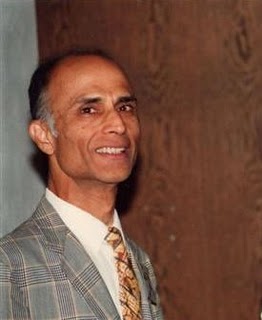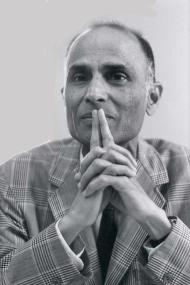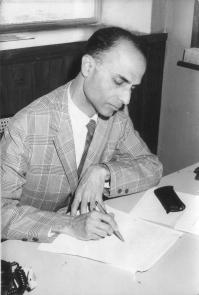<Back to Index>
- Mathematician Harish - Chandra, 1923
- Conductor Angelo Mariani, 1821
- King of Denmark and Norway Frederick IV, 1671
PAGE SPONSOR



Harish - Chandra (Devanāgarī: हरिश्चन्द्र, Harish Chandra Mehrotra; 11 October 1923 – 16 October 1983) was an Indian mathematician, who did fundamental work in representation theory, especially Harmonic analysis on semisimple Lie groups. From 1968, until his death in 1983, he was IBM von Neumann Professor in the School of Mathematics at the Institute for Advanced Study, Princeton. He was a member of the National Academy of Sciences of the U.S. and a Fellow of the Royal Society. The Harish-Chandra Research Institute, in Allahabad, India, is named in his honour.
Harish - Chandra was born in Kanpur (then Cawnpore), British India. He was educated at Scindia School, Gwalior, and at the University of Allahabad. After receiving his masters degree in 1943, he moved to Bangalore for further studies. In 1945, he moved to University of Cambridge as a research student of Paul Dirac. While at Cambridge, he attended lectures by Wolfgang Pauli,
and during one of them pointed out a mistake in Pauli's work. The two
were to become life long friends. During this time he became
increasingly interested in mathematics. He obtained his PhD in 1947 and during the same year he moved to the USA. When Dirac visited Princeton, Harish - Chandra worked as his assistant. He was influenced by the mathematicians Hermann Weyl and Claude Chevalley. From 1950 to 1963 he was at the Columbia University and carried out some of his best research, especially on representations of semisimple Lie groups. During this period he established as his special area the study of the discrete series representations of semisimple Lie groups — which are the closest analogue of the Peter – Weyl theory in the non-compact case. The methods were formidable and inductive, using Lie group decompositions (Harish - Chandra homomorphism). He is also known for work with Armand Borel founding the theory of arithmetic groups; and for papers on finite group analogues. He enunciated a philosophy of cusp forms, a precursor of the Langlands philosophy. He was a faculty member at the Institute for Advanced Study in New Jersey from 1963. He was appointed IBM von Neumann Professor in 1968.
He died of a heart attack in 1983, during a conference in Princeton in honour of Armand Borel's
60th birthday. A similar conference for his 60th birthday, scheduled
for the following year, instead became a memorial conference. He is
survived by his wife, Lalitha (Lily), and his daughters Premala
(Premi), and Devaki.
Harish - Chandra was a Fellow of the Royal Society and Fellow of National Academy of Sciences. He was the recipient of the Cole Prize of the American Mathematical Society, in 1954. The Indian National Science Academy honoured him with the Srinivasa Ramanujan Medal in 1974.
The mathematics department of V.S.S.D college, Kanpur celebrates
his birthday every year in different forms, which includes lectures
from students and professors from various colleges, institutes and
students' visit to Harish - Chandra Research Institute. The Indian Government honoured him by naming an institute dedicated to Theoretical Physics and Mathematics, after him, in Allahabad, India. The institute is known as Harish - Chandra Research Institute, abbreviated HRI.